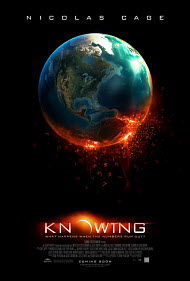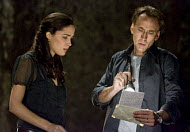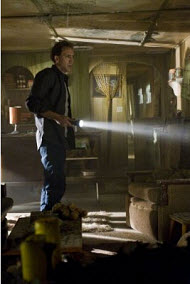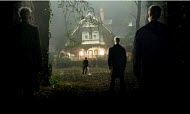Knowing
 for disaster sequences, disturbing images and brief strong language.
for disaster sequences, disturbing images and brief strong language.
Reviewed by: David Criswell, Ph.D.
CONTRIBUTOR
| Moral Rating: | Offensive |
| Moviemaking Quality: |
|
| Primary Audience: | Adults Teens |
| Genre: | Sci-Fi Action Thriller |
| Length: | 1 hr. 55 min. |
| Year of Release: | 2009 |
| USA Release: |
March 20, 2009 (wide—3,000 theaters) DVD: August 7, 2009 |




FALSE PROPHETS—Nostradamus, did he predict the bombing of the Twin Towers in New York? Answer
Is there valid prophetic evidence that the Bible is God’s Word? Answer
What does the Bible say about intelligent life on other planets? Answer
Are we alone in the universe? Answer
Does Scripture refer to life in space? Answer
Questions and Answers about The Origin of Life Answer







| Featuring |
|---|
| Nicolas Cage, Rose Byrne, Chandler Canterbury, Ben Mendelsohn, Nadia Townsend, Adrienne Pickering, Liam Hemsworth, See all » |
| Director |
| Alex Proyas—“Dark City,” “I, Robot” |
| Producer |
|
Escape Artists Goldcrest Pictures See all » |
| Distributor |
A heavy dose of New Age mystic-pantheism and Von Däniken’s Ancient Aliens
Alex Proyas is known for making “spiritual” movies. This should not be confused with making Christian movies, but it is no surprise that Proyas has a number of fans among Christian audiences. Films like “Dark City” and “I, Robot” both had heavy spiritual and religious themes although neither was particularly Judeau-Christian in scope. Proyas’ latest film, “Knowing,” continues this trend, but with a much heavier dose of New Age mystic-pantheism and Von Däniken.
Some have called “Knowing” a secular version of the Bible Code theory, but it is really more like what Von Däniken would have thought of the Bible Code had he heard of it. The movie is also eerily similar to a famous episode of Rod Serling’s Night Gallery, entitled “The Boy Who Predicted Earthquakes.”
“Knowing” opens with a apparently disturbed young girl placing a series of seemingly random numbers into a time capsule. Fifty years later the mysterious letter finds it way into the hands of John Koestler, an agnostic science professor who is also the son of the pastor. He soon discovers that the numbers are actually predictions of disasters that took place between 1959 and the present. Several “prophecies,” however, remain and John must struggle to find meaning in the prophecies and in his own life. Can he prevent the disasters to come? If not, why did he get the prophecies at all?
Obviously the movie poses great philosophical and theological questions. There is the arbitrary line of dialogue about “sciences” versus “faith” (a false argument set up by secularists) and in an early scene John Koestler discussed the theories of determinism and randomness. He eventually reveals that he believes there is “no purpose” and life and “s--- happens.” By movies end John has had a transformation, but the Christian viewer needs to realize that it is not a Biblical one, but a vague (pan)theistic one. I will discuss the theological implications below, but since it will involve spoilers, I will not recite it here.
If you don’t count deception, the movie is fairly clean morally. There are a few cuss words including two uses of the “s---” word early on in the film. There is violence including a young girl with bleeding fingers who was scratching something into a door, people are on fire following a plane crash, and numerous scenes of death following various disasters. None of the violence is particularly gruesome or exploitive, but because of the nature and scope of the violence the movie garnished a PG-13 rating which should be taken seriously.
Like most Proyas films, “Knowing” is well made piece of art with deeply philosophical and religious themes. Unlike his last two films, however, some devout Christians may be disturbed by direction of this films religious views; namely the views of Erich Von Däniken. This aspect needs elaboration, but will involve spoilers—reader beware.
Erich Von Däniken wrote a famous book called Chariot of the Gods. In his book, it is suggested that the angels of the Bible were actually space aliens, the chariot of Elijah was a spaceship, Adam and Eve were space travelers, and the miracles of the Bible were actually done by means of alien technology or similar theme. This New Age interpretation of the Bible has fascinated science fiction authors ever since. “Knowing” is the latest to follow this theory.
In this case, the angels of Ezekiel are aliens who come on a spaceship to “save” a small number of people who will populate a new world, like new Adams and Eves. In another scene John is talking to his pastor father and refers to the Gifts of the Spirit found in 1 Corinthians. Once again his definition of the gift of prophecy is foreign to the Bible.
The basic problem with the Von Däniken view is that it is essentially pantheistic. It views the universe itself as an intelligent entity and whatever cannot be explained in this way is transferred to aliens from another world, rather than to God as an intelligent, all knowing Creator. The theme has been promoted by science fiction shows ranging from “Star Trek” to “Space:1999” to “Battlestar: Galactica” to “Knowing.”
Atheist Richard Dawkins, in the movie “Expelled,” also suggested that life could have begun on an alien planet which was transferred to the Earth via aliens. Gene Roddenberry, creator of Star Trek, and avowed atheist, also incorporated this theme into many Star Trek episodes. This fact alone should make people realize that Von Däniken’s theories are not truly compatible with Christianity. God is ultimately replaced by highly evolved space aliens. It is for this reason that parents should make sure their young children understand that angels are not aliens. The concept is not only foreign to the Bible, but ultimately a way of diverting people’s eyes from God to outer space.
There is no doubt that Alex Proyas makes quality films with a deeply spiritual tone absent from most Hollywood films. As such he has gained a small following among Christian movie goers, but the Christian needs to be able to distinguish between “spiritual” and Christian. Proyas' latest film is entertaining, if a little poorly paced. It delves into many spiritual issues, but ultimately degenerates into a cliché ending that is rather disappointing.
Fans of Proyas will want to see the film, but Christian parents should educate their children to the nature of Von Däniken’s theories and ensure that the spiritual message of the film is not confused with Biblical Christianity. Overall, I give the movie a “B.” It is entertaining and thought-provoking, but seems unevenly paced, plodding at times, and offers an unsatisfactory ending. Nevertheless, I will look forward to Proyas' next venture in which I hope he will return to the form he showed with “Dark City” and “I, Robot.”
- Violence: Very Heavy
- Profanity/Vulgarity: Mild
- Sex/Nudity: Mild
Editor’s comment
Followers of Christ should alert about this film’s promotion of ANCIENT ALIENS or ANCIENT ASTRONAUTS theory, because this is an issue that is truly deceiving a very great number of people, partly because it is presented as scientific and archaeological (both false claims). At its base, it is a lie being used by godless people to “scientifically” explain away Biblical miracles and events—and God Himself.
This tactic started with atheist author H.P. Lovecraft. Years later, this pseudo-scientific idea was famously promoted by Erich von Däniken (Chariots of the Gods) and others. The Director of this film was inspired by von Däniken, and says so. This idea has particularly been used by some whose worldviews are New Age or Evolutionism/Atheism (or both).
The claim is that extraterrestrials with advanced technology came to Earth in ancient times and were mistaken for gods, angels and supernatural activity—and that out of these encounters with naive and unsophisticated humans (who misunderstood what they witnessed), humans began to worship these aliens—and the world’s religions (including Christianity) are the end result.
I have researched these claims in considerable depth, including attending von Däniken lectures. I am in agreement with many other researchers, the so-called evidence for this fantasy is filled with foolish errors and serious outright lies and deceptions.
Nonetheless, many sci-fi books, movies and TV shows have eagerly used and promoted what is essentially a dangerous Atheist-inspired worldview.
What difference does it make? When accepted, this pseudo-science leads people directly away from Biblical truth about Earth’s Creation, mankind’s place in God’s plan, Earth’s history of wicked rebellion against the Creator, and the record of His judgments. Inherent in this worldview is rejection of belief in God and the Bible. People are less likely to perceive their spiritually bankrupt state before God and are more unlikely to want—or listen to—the Gospel.
Entertainment dramas that use the ancient extraterrestrial encounters fantasy and thus promote it some extent…
- “Stargate”
- “Prometheus”
- “Knowing”
- “Thor”
- “The X-Files: Fight the Future” etc.
- “Alien vs. Predator”
- Transformers: The Last Knight and most of the “Transformers” series
- “Outlander”
- “The Fifth Element”
- “Mission To Mars”
- “Star Trek” various episodes, including “Star Trek: The Next Generation—The Chase,” “Star Trek: The Next Generation—Who Watches the Watchers” —Gene Roddenberry, creator of “Star Trek” was an opponent of all beliefs in God
- “2001: A Space Odyssey”—the monolith
- “Earth: Final Conflict”
- “Space: 1999”
- “Quatermass and the Pit”
- 65 (2023)
If nothing else, the mere CONSTANT REPETITION of this view of history in entertainment media is causing it to become embedded in the minds of billions of people, making it somehow seem to them less ludicrous than it really is. Discerning Christians know that we and God have an Enemy who is the father of lies who seeks to deceive the whole world.
See list of Relevant Issues—questions-and-answers.


[SPOILER ALERT]
I saw others mention that the ending is completely unbiblical, however if you watch the symbolism ONLY, it becomes quite biblical. The Word says that the Earth would never be destroyed by water again, but by fire. It also says that the elect are not appointed to wrath, but would be “harpazo” or taken into protective custody, and would return to a “new heaven and a new Earth.”
[END SPOILER]
This is what happens in the movie. Although not the way the Christian should believe it will take place, as it does not involve God or give Him glory, but symbolically, for a non-Christian film, I think they did just fine.
Also, many Christians believe that when Jesus said “As the days of Noah were, so shall it also be at the coming of the son of man,” They take it to mean that the fallen angels will be appearing in the last days, as they did prior to the flood (See Genesis 6 and the pseudo-epigraphical book of Enoch). These Christians believe that the fallen angels will show up, not as angels, but as Extra-Terrestrials. This could play a huge role in the end-times deception if people begin believing things such as is depicted in this film, which is also what the ancient Sumerians believed.
Moral rating: Better than Average / Moviemaking quality: 4
I hated the Omega Code because unlike this movie, they tried to use pathetic cultish codes to reveal a whole number of things. This movie uses “prophecy” as its main tool and a kid who writes down a bunch of exact codes and numbers. It was not hard to figure out and it was not some moronic omega code. Instead this movie focuses more on the fact that you better believe or fry.
…Language: Yes, there is a little bit of language including some GDs and there is certainly a lot of violence. This is a great movie to watch and talk about with older kids.
I highly recommend this movie, its a lot better than a lot of the “Christian” garbage that is out there today. Recommended Christian Movies: “Luther,” “Amazing Grace,” “Facing the Giants” and “Fireproof.” “Left Behind” is boring fiction, as are most of the end times movies. This is an end time movie that sticks with you. No the acting is not perfect and the kid in the movie is annoying. Some of the writing is cheesy, but when you are done with the movie, you are blown away.
Moral rating: Better than Average / Moviemaking quality: 3½
As a warning, the movie has elements of a horror movie, although it is not primarily of that genre. Small children could definitely get overly frightened or have nightmares from some of the scenes. I got goose bumps on a few scenes.
I give the movie a B, but with this added note: it’s more than just another movie. It deals with faith, family, prophesy, death, and the end of the world. You can’t say that about too many movies. I think the majority of people who are open to spiritual thinking would think more about God and their life from viewing this movie, though it does not directly attribute spiritual things to God. To a person prone to want to attribute spiritual phenomena to organized aliens than God, this movie could be a stumbling block.
Moral rating: Better than Average / Moviemaking quality: 4
Moral rating: Better than Average / Moviemaking quality: 4½
Moral rating: Better than Average / Moviemaking quality: 4½
I realize that some people may not want to hear this, but this movie is meant to be fiction. Although the character of John Koestler begins the film as an atheist, from his actions and demeanor, we can determine that his belief is based upon a tragic event (the death of his wife) and is not a hedonistic or evil choice. Not that I condone it! His son on the otherhand, maintains a belief, along with the rest of his family. His lecture on determinism v. randomness illustrates where Koestler’s faith lies, and serves as the starting point for a spiritual journey. Upon discovering the list of predictions, Koestler’s belief in “S*** happens” is shaken. He begins to sea life as more than just a “series of chemical accidents and biological mutations” and instead starts to understand that life does have an underlying meaning.
While the movie does not directly reference biblical evidence or cite scripture, it does imply a divine influence. The “aliens” come as thieves in the night, as referenced by one coming to Caleb and pointing (choosing) at him. Koestler confronts one and demands an answer to who the being is, and is blinded and overcome by the being’s speech.
The idea of a superflare is a very old one, and very realistic. Science acknowledges things called “Gamma Ray Bursts” these are incredibly intense bursts of radiation, that are more than capable of bathing planets in deadly heat and radiation. About the actual destruction, doesn’t the Word say that God will destroy the world with fire? (Matthew 13:40, Luke 3:17. Luke 12:49, Hebrews 10:27, Hebrews 12:29, 2 Peter 3:7, 2 Peter 3:10, Revelation 8:5)
I must reiterate that this movie is a work of fiction and should not be interpreted in any way as a religious document or what have you, but rather as an entertaining film that has a spiritual sub-text.
I would recommend this film for Christians who have a strong grasp on the line between fiction and reality, and who are confident enough in their faith to not be swayed by the ideas therein. Personally, I will be purchasing this movie on DVD and will recommend it to all of my friends within my church.
Moral rating: Average / Moviemaking quality: 4
Moral rating: Good / Moviemaking quality: 4½
Moral rating: Good / Moviemaking quality: 4½
Carpe Diem! Seize the day! for tomorrow you may be dead, but don’t be stupid either make smart choices as long as they are just.
I think that the rapture-like scene near the end of the movie might have been more of a genetic kind of then as a faith kind. because the main character’s father, the pastor, he was devout or at least he seemed to be, yet his mortal form died as well. So I think that maybe the ones who were chosen to escape Earth’s destruction had enough genetic diversity and the least amount of harmful mutations in the DNA to restart the human race without causing it to fall apart from the lack of genetic diversity. It would make sense too, I mean without genetic diversity, you end up with people who were cursed with harmful afflictions caused by genetic defects, it would sort of end up like inbreeding or something similar to it might not happen right away, but it would eventually happen.
Of course that doesn’t explain how 2 people could sire the whole human race without harmful side-effects, if you believe the adam and eve story, unless our inherent aggression might be a side-effect. but I always found the adam and eve story to be a bit ridiculous and very very confusing to me.
Anyway I found this movie to be quite good and it did give me a boost in my Faith, which wasn’t that high and when I walked out of the Theater I felt zoned out, and the world seemed to have more significance than it did before, and it caused me to be more thankful of what I have in life. and no I did not take anything, and I do not do drugs, hell I don’t even like smoking! I would buy a gas mask if I could just to get away from that stuff, the movie just awed me.
Moral rating: Average / Moviemaking quality: 5
Moral rating: Better than Average / Moviemaking quality: 4
On a moral standpoint it has decent dramatic elements. Nicolas Cage’s character, Ted, is a science prof. at MIT, and the movie is mostly about him finding God again after he loses his faith after losing his wife. Very similar to M. Night’s “Signs” with Mel Gibson.
Moral rating: Excellent! / Moviemaking quality: 4½
Moral rating: Better than Average / Moviemaking quality: 5
Nicholas Cage is the perfect actor for this movie, in that when he realizes what is occurring, he becomes unglued albeit in a reserved way. Cage does that as well as any actor. I wish there were more movies that allowed us to extrapolate Christian themes, and explore how they are all intertwined with this world.
Moral rating: Better than Average / Moviemaking quality: 4
Moral rating: Better than Average / Moviemaking quality: 5
Even though Proyas hijacked Christian doctrine to make his movie, in the spirit of holding all things captive to Christ, it is still a fun exercise to work backwards from the movie to the biblical themes. At some point, almost every allegory breaks down because of where the director takes it, and this needs to be explained.
However, many parts of the movie stood out as great teaching tools (in the very least pretexts) for biblical themes. Here are just a few: Doubt, Struggling with faith—The scene where Caleb challenges his father, “you don’t even believe in heaven.” The father replies, “I only said we can’t know for sure.” Reminds me of Mark 9:24. “Help me overcome my unbelief” Saved by grace—There was nothing that Caleb or Abby did that seemed to merit their selection for the trip. They were simply chosen by the will of the “savior.” Ephesians 2:8 says you were saved by grace, not by works. John 15:15 Jesus says, “You did not choose me, I chose you.” Hope—The pastor portrayed the hope of a Christian quite well (the part where Nick called his dad).
The dialogue was weak, but the countenance of the father conveyed well the quiet hope that Christians have. Sharing the faith—Nick’s sister played the part of the relentless, yet patient, Christian sharing her faith and praying for her skeptical brother. What would you do if you were in the sister’s shoes? What would you say? 1 Peter 3:15.
Moral rating: Better than Average / Moviemaking quality: 4
Moral rating: Excellent! / Moviemaking quality: 5
The movie moves at a reasonable pace, and the script is not irritating. I work in 3D special effects, and this film has good quality CGI. I’m only here writing this because of how frustratingly ignorant and secular the ending is. The writer probably was not trying to force anyone to think his story is to be believed as prophecy, but I yelled out blasphemy at the end, all the same.
Moral rating: Good / Moviemaking quality: 3½
Moral rating: / Moviemaking quality:
I must say if you want to make this sci-fi movie into biblical truth than one would be left offended. However, I will not view such a movie nor any movie that deals with apocalyptic events as truth, for all that I have seen fall far short from the truth, many fall into being absolutely ridiculous. This movie stays with what it is, a sci-fi flick, in comparison Christian movies and books for that matter about end time events have been as far fetched and more outrages in my opinion than this movie could have ever been.
I thought it was a great film overall, very interesting and entertaining.
Moral rating: Better than Average / Moviemaking quality: 4½
I found some of the characters’ rationale inane. For example, Nicholas Cage’s character finds out about where the disasters are about to occur, and races to the exact spot to see it unfold, only realizing afterward his inabliity to prevent it. I saw several Biblical references in the film. Aside from the Ezekiel 1 prophecy, the parting of father and son alluded to the reference that “one will be taken and the other left.” Also the final scene where the children are running towards the huge tree references the garden of Eden. Mormons might find comfort in the reference to God’s placing of people in a “new world” to create their own world.
It is not, nor should it be construed as a Christian film. It is science-fiction, pure and simple. Sci-fi movies often make allusions to biblical passages, events and circumstances, but keep in mind it is only a movie. To get some Christian message out of the movie is to miss the point of the movie. It is entertainment, and to expect anything more is unreasonable.
Moral rating: Better than Average / Moviemaking quality: 3
Moral rating: Average / Moviemaking quality: 4
The overall mood of the movie was just unpleasant, with an underlying evil to the whole thing. In the end, I felt ashamed at myself for not heeding the warnings that were given to me here on this site by the discerning people who said that this movie was negative and unChristian.
In the future, I will NOT make the same mistake. I hope that you, Reader, will save your money and that you do not place this wickedness before your eyes.
Moral rating: Extremely Offensive / Moviemaking quality: 3
Moral rating: Very Offensive / Moviemaking quality: 5
Moral rating: Extremely Offensive / Moviemaking quality: 5
The film became even more promising when we discover that his father is a Pastor and his sister (cousin?) is also a believer and offers to pray for him in his crisis.
However, all of this is undone in the resolution that takes place in the last 15 minutes of the movie. We are left to conclude that biblical images such as the vision of Ezekiel or human concepts of angels are simply distorted human perceptions of extra-terrestrials and their space travel vehicles.
The film attempts to “respect” faith in general and the Christian faith in particular by sympathetically explaining how these beliefs are erroneous, but well-meaning. It also attempts to bring some comfort as the hero’s young son and another girl are rescued from the destruction of the world by the aliens who transport them to another planet along with a number of other children to re-start the human race. Furthermore, we see the main character change to a world-view in which there is purpose.
However, the effect is, ultimately, dismal. Just before they are killed the Pastor/father tells his son that this is not the end and the son replies that he knows, but so far as we can tell it is the end. The movie does not affirm a Savior Who triumphs over death or a life after death in which all true believers are united in the presence of their Lord. What is the comfort? Is it a genetic comfort that the main characters progeny will continue on another planet? Is it that the main character will be remembered after his death by his surviving son? If this is all, then it is a very hollow comfort and that is the effect of the movie on someone who believes in a glorious future secured by an all-powerful God for His people.
Incidentally, I could not help but contrast this movie with “Signs,” a far better crafted film and one that affirms faith in the context of encounters with alien life. Indeed, in “Signs” it is the preserving power of God that defends the human race against the malevolent intentions of the alien invaders. In “Knowing,” it is the benevolent aliens who preserve a tiny portion of the human race and God is not evident.
I do not recommend this movie to believers unless you want to be informed regarding the willingness and, even, eagerness of some unbelievers to believe in extra-terrestrials and attribute inexplicable aspects of human existence to them rather than admit a Creator God.
Moral rating: Very Offensive / Moviemaking quality: 3
Moral rating: Extremely Offensive / Moviemaking quality: 4
Sadly, this film is very dangerous to those without a true biblical foundation of creation, because it will support the lie of evolution, which is being taught in most universities today.
As the movie ended, I was left with a feeling of hopelessness. But thankfully, I can stand on the truth of the bible, because the evidence of creation demands a Creator! It boggles the mind why someone would want to go the all the effort it takes to make a feature film, just to paint a picture of hopelessness, unless of course, they were just trying to promote their world view. As this movie points out, if evolution is true, then what’s the point of life? Thankfully, evolution is a lie, and we do have hope in eternity through the promises of the Creator God of the bible, but not with aliens. I wanted to stand up and shout, who created the aliens?
Moral rating: Very Offensive / Moviemaking quality: 4½
Moral rating: Average / Moviemaking quality: 5
Moral rating: Very Offensive / Moviemaking quality: 4
Moral rating: Very Offensive / Moviemaking quality: 3
Moral rating: Offensive / Moviemaking quality: 3
Moral rating: Extremely Offensive / Moviemaking quality: ½
Moral rating: Extremely Offensive / Moviemaking quality: 3
Moral rating: Offensive / Moviemaking quality: 4
Moral rating: Offensive / Moviemaking quality: 4
Also pay attention to the fact that Nicholas Cage’s atheistic character can only accept the ideas of “angels” and “Heaven” after they appear to him in a way he can accept… as aliens. It is not because he wants redemption or forgiveness. Also disturbing and offensive is that the children hearing the whispering voices are tormented by them and one commits suicide later in life. This is more reflective of demonic influence and to attribute it to any thing Godly, as is obvious by the references to the Bible in the film (Ezekiel), is blasphemy.
Moral rating: Very Offensive / Moviemaking quality: 3½
Moral rating: Extremely Offensive / Moviemaking quality: 2½
Nicolas Cage was miscast, and the characters in general behaved as oddly as he did. We didn’t expect that a Christian worldview would be applied to the story, and even came away surprised that a small shred actually made it into the movie. However, I thought the writing was sloppy, and huge opportunities to make it a far more intelligent film were passed over.
A bit of a nitpick—I hate it when they get specific about what locations the story is set in, only to end up obviously not shooting in those locations. I lived the Lexington, Massachusetts area for several years, and the landscape used in the movie hardly resembled it (an airliner in distress would have likely been diverted to VERY nearby Hanscom AFB, and found no large empty field next to a highway to crash in). Other than a few local establishing shots, the film looked like it was shot somewhere else (Australia, as I recently learned).
Moral rating: Offensive / Moviemaking quality: 3
Moral rating: Offensive / Moviemaking quality: 4
“Knowing” is NOT one of those films. The story is intriguing but its execution was terrible. Nicholas Cage plays the same character here that he does in every movie he’s in. He and all the other characters are wooden and uninteresting. The special effects are pretty terrible for a big-budget film. (My least favorite effects scene was the plane crash, the flames look like something straight out of my Star Wars computer game.) Then comes the part where they reveal that Ezekiel hadn’t really seen angels, it was aliens. That really ticked me off. It went from “I’m guessing aliens are behind it” to “Oh, this movie is a huge bash against Christianity.” **(One positive reviewer of this movie, on this site, says that this film is “100% Christian”.)** What? How? That same reviewer went on to say “Christian films are boring” (or something to that effect). He didn’t like “Left Behind” because it was so fake? I really wonder if that guy has ever read Revelation, much less the Bible.
***SPOILER*** When the children were taken away and transported to what can only be “The New Earth,” skipping through the fields with their white rabbits (Huh? Movie Quote: “They say we can keep them.”) I was certain steam was coming out my ears. How ridiculous and offensive!! ***SPOILER END***
The kind of movie that’s even worse than one that blatantly pokes fun at my faith (obviously easy to avoid) is one that sneaks that message in and hits you broadside. “Knowing” is that kind of movie, it goes from aliens to alien who are really angels, that’s where Christianity came from sort of deal. Besides that though, the script is weak, there are a lot of slow scenes, the acting is pretty bad (especially the little boy), the special effects were a failure and I just couldn’t take “Knowing” seriously. It’s not scary (though it is desperately trying to be) or smart or interesting or anything that makes a good film.
My sister, her friend and I still make fun of that one scene where Nicholas Cage hits the tree with the bat and yells “Come on!” when trying to get the men (of course, aliens) out into the open so he can see them. So stupid. Just don’t see this film, that’s the base of it.
Moral rating: Extremely Offensive / Moviemaking quality: 1½
Moral rating: Extremely Offensive / Moviemaking quality: 4
Moral rating: Extremely Offensive / Moviemaking quality: 4
The black stones represent the dead, that’s why they rose in the end. The fire rolled over the Earth from the east to the west destroying it and all its inhabitants. The creepers were Gods angels looking out over them the entire time, and who is to say angels are not “aliens”, so are we. Also I believe the “Space ships” were chariots used to carry out the rapture, God can use what ever He wants. This movie has many interesting metaphors and interpretations and I am going to watch at least twice more. I believe this movie will be a tool used for Gods glory whether it was intended for that or not. It touched me and provoked a lot of questions and I know you will feel the same.
Moral rating: Good / Moviemaking quality: 5
Moral rating: Average / Moviemaking quality: 3
Acclaimed film critic Roger Ebert called this “The best science-fiction film he’d ever seen.” Good: yes. The best ever? With movies like “Star Wars,” “The Matrix,” and a lot more, that’s a pretty tall claim to make. And while I agree that it had a brilliant plot that was easy to follow with great direction (I really enjoyed “iRobot,” also directed by Proyas), I found that this movie had two major filmmaking issues:
1) The acting was really cheezy at parts. I’m sorry, but I don’t think I’ve seen Nick Cage act well before, and while he had some good moments in the movie, others were laughably bad.
2) I was surprised by how bad the CGI in the movie was. I think the effects would be good if this were a 90’s flick, but with movies to compare the effects to today, like “Transformers,” I was quite disappointed. I don’t normally notice those sorts of things, but in this case it was quite obvious.
While I didn’t like those things in the movie, I think the plot and direction makes up for it. Again, there are theological issues in the movie (definitely not a Christian film), but if you can look at it intelligently and discuss it with a friend afterwards (that’s what I did), then I think this is a nice matinee popcorn flick.
Moral rating: Average / Moviemaking quality: 3½
Moral rating: Average / Moviemaking quality: 4½
That is my theory of what happened, but it would have been better for the movie to show who or what got out of some of the other ships. It is obvious that they have taken some Bible concepts and changed them. (For example—the aliens/angel type creatures who cared for the children, but had no care for the adults.) Other than that I think the movie was great. It had its ups and downs, but, all in all, it was good. I would watch it again.
Moral rating: Better than Average / Moviemaking quality: 4
Moral rating: Average / Moviemaking quality: 3
Moral rating: Good / Moviemaking quality: 3
Moral rating: Better than Average / Moviemaking quality: 5
The special effects were varied from extremely lifelike to cruddy computer animations that made me literally laugh in the theater. All in all, I would say that this is not one to waste your money on…
Moral rating: Offensive / Moviemaking quality: 3½
Moral rating: Better than Average / Moviemaking quality: 3½
And about the cussing, I was thinking. If you were about to die in a plane crash, or metro station accident, or even solar flare that would bake the ozone layer off the Earth, would you cuss? I think I certainly would. The movie had no sexual content, not even a kiss, which surprised me. It was more a psychological movie than anything else. You had to remember everything about the movie.
Overall, I would definitely suggest this movie to people. I, also, think at the end that it sort of reminded me of Eden, how beautiful it was, and then they went over that hill and they saw that big tree.
Moral rating: Average / Moviemaking quality: 5
Moral rating: Average / Moviemaking quality: 5
Moral rating: Average / Moviemaking quality: 3
If there was anything theological in the movie it would be from a Calvinistic tone about that ***spoiler*** only who were “called” in the movie got to go and the rest had to die.
***end spoiler***
The whole premise of the movie is a lot like “Angels and Demons” and other movies that basically put a high man of science in the battle to understand seemingly random or nonspiritual things that eventually change his/her mind about it and adds the spiritual tone to it, yet it still must be understood about science.
The idea of a few people or an Adam and Eve-like pair surviving the apocalypse of the Earth to create a new Earth is very interesting. Though it makes for great special effects in movies it ends up that we just get the same thing every time because it is a common theme among apocalyptic storylines. Good movie, excellent quality, questionable integrity, yet, overall, darn good.
Moral rating: Better than Average / Moviemaking quality: 5

I came home and I read the first chapters of Ezekiel and what I found there was a pleasant surprise… the “aliens” and the “ship” in the movie were very closely resembling of the biblical visions. Why do we have to take the spin that the creatures were aliens in place of where Gods' angels were to be and instead think of the creatures as angels of God? Overall, I don’t ever go to a movie expecting anything from Hollywood to be wholesome Christian entertainment and often don’t go at all. But this movie had none of the morally offensive stuff we typically find and if your faith is well grounded in the Word, then the science fiction aspect of it, if that’s how you want to interpret it, won’t bother you.
My Ratings: Moral rating: Average / Moviemaking quality: 4